As an Amazon Associate I earn from qualifying purchases.
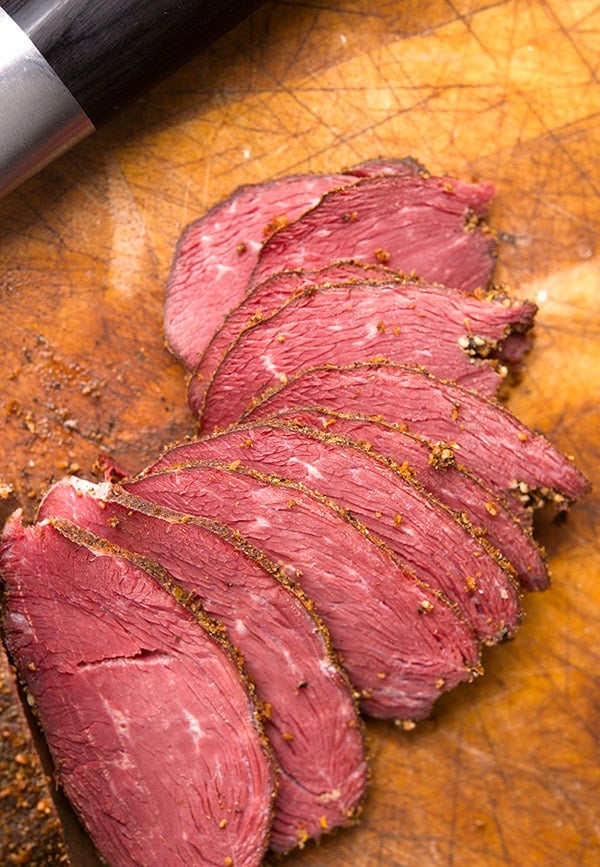
Goose pastrami is what I do with most of my Canada goose breasts. It is an easy project that makes the most out of these often-tough slabs of meat.
Why geese? Well, Canada and snow geese are very close to grass-fed beef in flavor (they eat the same thing), they have large, easy-to-work-with breasts, and they do have a tendency to be tough, which means that any way you can cook them that lets you slice the breasts thinly is a good thing.
Pastrami, in case you’ve never had it, is a cured meat from Eastern Europe or Turkey — remember the Ottomans ran Eastern Europe for a while — that’s normally beef or mutton. Although here’s an interesting tidbit from Wikipedia: “Among Jewish Romanians, goose breasts were commonly made into pastrami because they were inexpensive.”
So there ya go. This is traditional!
To make pastrami, you dry cure (sometimes brine) the meat for a few days, dry it a bit, coat it in the characteristic black pepper and coriander and then smoke it. Sliced thin on a sandwich, it’s God’s gift. Good pastrami at a Jewish deli is something you must eat at least once before you die.
If you have any goose breasts in your freezer, go for it. A pastrami on rye with good mustard, a slice of cheese and maybe some sauerkraut, and you got yourself some awesome there!
Once you make your pastrami, it will need to be eaten within a week or two, or you’ll need to vacuum seal and freeze it.\
Goose Pastrami
Ingredients
- 2 skinless Canada goose (or domestic goose breasts
- Kosher salt see recipe notes
- 3 grams Instacure No. 1, good for up to 3 pounds of goose
- 1/2 teaspoon dried thyme
- 1/4 teaspoon celery seed
- 1/4 teaspoon caraway seed
- 1 teaspoon sugar
- 1/4 teaspoon crushed juniper optional
- 1 teaspoon ground black pepper plus 1 tablespoon ground black pepper
- 1/4 cup brandy red wine, vinegar or water
- 1 tablespoon ground coriander
Instructions
- Weigh your goose breasts. For every pound of goose, you'll need 10 grams of kosher salt, which is about a tablespoon. It's OK if you are a little off on this measurement. Mix the salt, curing salt, sugar as well as the thyme, celery seed, caraway, juniper and the teaspoon of black pepper and grind them all together in a spice grinder. Pack the goose breasts with this mixture, massaging it into the meat. Put the goose into a closed container in the fridge for 24 to 72 hours.
- When you are ready, rinse off the goose and pat it dry. It's fine if you have a little bit of the cure stuck to the meat, but you don't want too much. Put the goose breasts on a rack in the fridge and let them dry uncovered for a day.
- Dip the goose into the brandy -- or really any other liquid you want -- and then coat thoroughly in the remaining black pepper and ground coriander seed. I like to grind this myself so the texture is a little coarse, a little fine.
- Smoke the goose breasts until the interior hits 140°F, which takes me about 3 hours.
- Let the goose pastrami cool and eat as lunch meat, or on crackers or whatever.
Notes
Nutrition
Nutrition information is automatically calculated, so should only be used as an approximation.
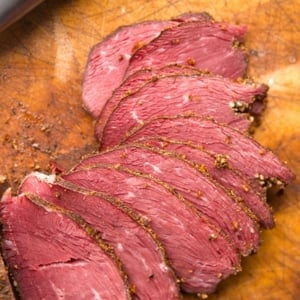
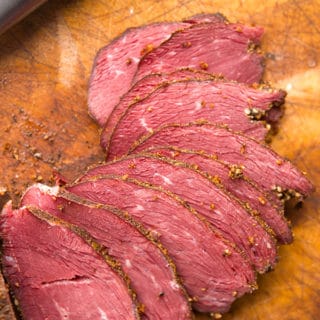
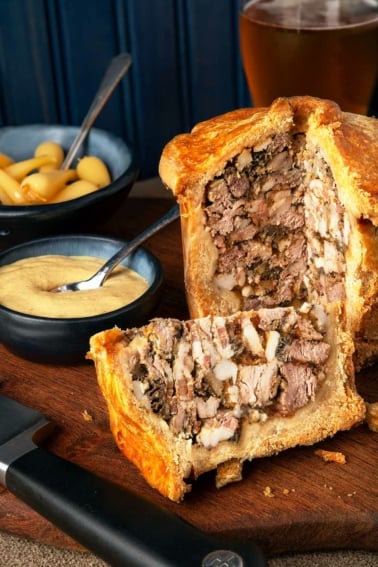
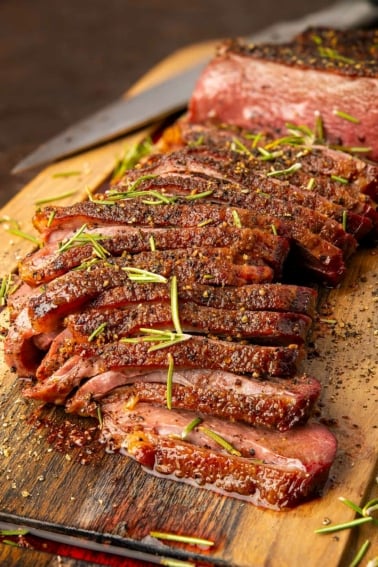
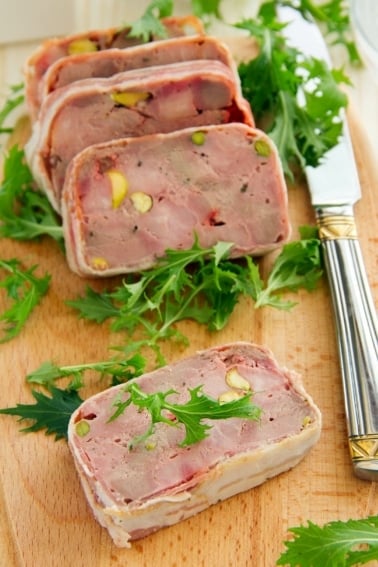
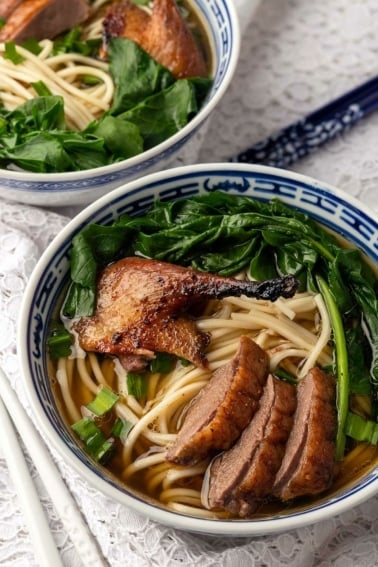
Any suggestions on rewarming leftover cooked pastrami after it’s been refrigerated? Don’t want to dry it out.
Jim: I mainly eat pastrami at room temperature in sandwiches. But you could steam it: That’s what they do at Jewish delis.
Hi Hank, do you have a recommended oven temperature to make this? No smoker here, but thinking a low temp oven will do the trick.
Travis: I’d go with something slow, like 275F
Thank you for the great idea and recipe. Always love your stuff. What are your thoughts on serving this hot off the smoker rather than as a lunchmeat after it rests and cools? Should it get cooked past 140 if doing so (170-175? Or take it all the way to 200) or do you think that 140 will be fine from a mouthfeel standpoint even hot? I am tending to lean towards slow and sear as you would with a young or farm raised goose breast.
Greg: Yes, I’ve done that. I actually like the texture at 140. Kinda like a hot Reuben.
Hey Hank, trying this with a wild turkey this weekend….any advice?
Love You Man!!
Alli: I dunno… never tried it on a turkey breast. Definitely want to brine it. Maybe use my smoked wild turkey breast recipe, but then use a rolling pin to mash the pepper/coriander mix into the meat before smoking?
Thank you Sir. That sounds like a great plan, I will let you all know how it turns out!
Is overnight ~ 12-16 hours enough drying time, or does it need a full 24 hours of drying?
Paul: Yes, overnight will work.
Hi Hank,
I’m starting this recipe for the first time today with some Canadas, specks and sage grouse (why not!?). I’m assuming by juniper you mean berries? I don’t have any so I’ll proceed without, but it got me wondering what is the best time of year to harvest juniper berries? I’m in Wyoming and have easy access to a Juniper trees.
Matt: Anytime, really, You want them fully purple. Many varieties need 2 years to ripen.
Hi Hank!
Would it be okay to make this recipe without the instacure or using celery powder instead?
Thanks!
Reilly: Celery powder is the same nitrite as instacure, so you are not avoiding nitrites by using it. But if that’s what you have, you can use it — only I am unsure of how much you’d need.
Hank,
When did you change the recipe from using 22 gr. of Kosher salt/lb of goose to 10 gr.? But it still says “which is about a tablespoon.” I weighed a tablespoon of Morton’s Kosher salt and it was 20 gr. I have some Diamond Crystal, which is lighter than Morton’s, but I have not weighed it to see if it’s in the 10 gr/T range. Cutting the salt by more than half by weight is significant. Just wondering what gave rise to the change.
Regards,
Mark
Mark: I changed it into an “EQ” cure, which is less salt, but takes more time to cure, BUT, will never get overly salty. The original works great, but you can let it go too long and it will get overly salty. This version won’t, even if you keep the meat curing for more than a week.
I’ve made this recipe a couple times and really enjoy the product and the process. This is a great way to use up a bunch of goose and a unique meat to have on a charcuterie board or making a heavenly Ruben! The juniper is a real flavor boost I’ve gotten hooked on, and enjoy being able to forage for it as well.
Can’t wait to try it!! How important is it to let the breasts dry in the fridge? I forgot about this step and was looking to smoke it today but only have been letting it sit in the fridge for a few hours.
Nick: You might be OK. It does need at least a few hours to dry.
Thanks! I wound up waiting anyway they are going in the smoker this morning!
Excellent recipe… Followed exactly with some adjustments for about 5lbs of meat. Did 48 hrs in the fridge with the Instacure #1 and then 24 hrs to dry after washing brine off. Made some really good sandwiches with mustard and sauerkraut… will 100% be following this recipe again & again.
Don’t have a smoker so I added a few drops of liquid smoke to the brandy before dipping and cooked these in a 200 degree oven for a few hours and it still turned out amazing. Put on a charcuterie board with a variety of cheddar and homemade mustards and it was a hit. Definitely a favorite for all the goose my husband brings home!
Thank you! We have a fire ban which means I can’t smoke with my set up so am giving this a shot. Thank you for sharing! Almost done ‘baking’ and it smells so good
Hey Hank,
Love this recipe. I’m curious, do you think it could work with goose thighs? I realize curing and cook time will be different and it may not slice up as nice, but I was thinking I could use them as a topping or crumble on something? Or maybe better to try as corned vs pastrami? Any other considerations? Thanks again!
Brett: Maybe? I bet you could ultimately use it minced in something like corned beef hash.
Hey Hank….20 Greater Canada breasts just got split up into jerky, corned, sausage and
pastrami. All terrific. But a question on the pastrami: it didn’t turn out pastrami-like, just basically smoked breasts, which are still tasty but a little dry and kinda dense. They wound up air-drying for close to 2 days after curing for 2 and duh, I forgot the coating. Smoked for 3 hours. Do you think the drying time was the culprit? Anyway, thanks for all the great stuff.
Eric: Yes the drying time, but moreso the lack of coating. It’s the coating that make it pastrami.
I’ve made your Venison Pastrami before and am now going to attempt the Goose Pastrami!
This is probably a dumb question to most, but If I am doing say 6 goose breasts (cure recipe calls for 2 breasts), besides the salt and cure amounts which I know should be based on the total weight, should I be putting in the same amount of the remaining dry cure seasonings for each 2 breasts that I’d be smoking? As in, tripling up on the other dry cure ingredients since I’d be doing 6 breasts?
Matt: With pastrami, yes, since the seasonings are pressed into the meat before smoking.
Do I have to use Instacure No. 1 or can I substitute pickeling salt or sea salt?
Neva: You need curing salt for real pastrami. If you skip it, it won’t have the right color or flavor.
This recipe is delicious and pretty easy.
Thanks for posting this. The internet is good that there is content like this. I have compared your recipe to all the main ones online for Canada Goose Breasts. The two main distinctions I noticed are A. you are online soaking for 1-3 days, while they are brining for 3-4 days. The others do not leave it sit in the fridge for a day after, I like that yours does. I believe this likely causes the meat to firm up before smoking. The other possible difference is you say you just rinse yours, while they specify to leave in fresh water for 30 minutes after cure. Thanks for posting.
Ive used this recipe for so many friends and family members who’ve never eaten wild game before, and it never fails to disappoint! It’s a go to recipe for goose breast in my opinion.
I think you meant never fails to impress, or never disappoints. 🙂
Got some friends that dont like Goose? Feed them this!